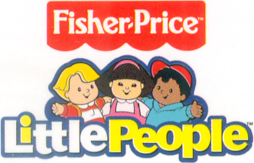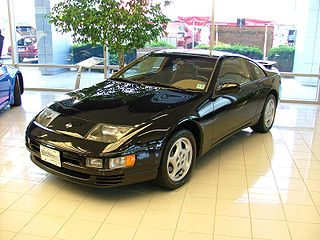An action figure is a poseable character model figure made most commonly of plastic, and often based upon characters from a film, comic book, military, video game or television program; fictional or historical. These figures are usually marketed toward boys and adult collectors. The term was coined by Hasbro in 1964 to market G.I. Joe to boys.

The diabolo is a juggling or circus prop consisting of an axle and two cups or discs derived from the Chinese yo-yo. This object is spun using a string attached to two hand sticks. A large variety of tricks is possible with the diabolo, including tosses, and various types of interaction with the sticks, string, and various parts of the user's body. Multiple diabolos can be spun on a single string.

A spinning top, or simply a top, is a toy with a squat body and a sharp point at the bottom, designed to be spun on its vertical axis, balancing on the tip due to the gyroscopic effect.

Little People is a toy brand for children ages 6–36 months and to ages 3 and up, originally produced by Fisher-Price, Inc. in the 1960s as the Play Family People. The current product line consists of playsets, mini-sets and accessories, books, CDs, and DVDs focusing on various configurations of a group of characters by their names. Mattel reports that since the brand's launch, over 2-billion Little People figures have been sold in over 60 countries. In 2016, Little People was inducted into the National Toy Hall of Fame.

Hot Wheels is an American brand of scale model cars invented by Elliot Handler and introduced by his company Mattel on May 18, 1968. It was the primary competitor of Matchbox until Mattel bought Matchbox owner Tyco Toys in 1997.
Shogun Warriors was a line of toys released by Mattel Inc. in North America from 1979 to 1980.

The Nissan 300ZX is a sports car that was produced across two different generations. As with all other versions of the Z, the 300ZX was sold within the Japanese domestic market under the name Fairlady Z.
Big Jim was a line of action figure toys produced from 1972 through 1986 by Mattel for the North American and European markets. He was renamed Kid Acero in Latin America and, for a short period of time, Mark Strong in Europe. Originally inspired by G.I. Joe, the Big Jim line was smaller in size and each figure included a push button in the back that made the character execute a karate chop action. The action figure's arms were made of a soft plastic/vinyl material and contained a mechanism that simulated the bulge of a biceps when the elbow was bent. Big Jim was less military-oriented than the G.I. Joe line, having more of a secret agent motif, but also had a large variety of outfits and situations available including sports, space exploration, martial arts, hunting, western, camping, fishing, and photography.
Major Matt Mason was an action figure created by Mattel. He was an astronaut who lived and worked on the Moon. When introduced in 1966, the figures were initially based on design information found in Life Magazine, Air Force Magazine, Jane's, and other aviation- and space-interest periodicals. Later, the line attempted to transition into the realm of science fiction.
Action Force is a brand of European action figures released in the 1980s that was based on the Action Man toyline. It was also used to introduce G.I. Joe: A Real American Hero toys to European markets. Several publishing companies have produced comic books based on the figures.
The Incredible Crash Dummies is a line of action figures designed by David McDonald and Jim Byrne, styled after the eponymous crash test dummy popularized in a public service advertising campaign of the late 1980s, to educate people on the safety of wearing seat belts. The toys were first released by Tyco Toys in the early 1990s and discontinued in 1994. From 2004 on, a new series of animated shorts involving the crash dummies was produced and the action figures subsequently revived under the Hot Wheels brand, another subdivision of Mattel.

The Super Powers Collection was a line of action figures based on DC Comics superheroes and supervillains that was created by Kenner Products in the 1980s.

Batman action figures have been produced since the 1940s. These action figures, inspired by the character's appearance in comics and serials, were created by DC Comics and manufactured by various toy companies. These figures were made of various materials such as wood, tin, and plastic. They were typically between 6 and 8 inches in height and featured movable joints that allowed them to be posed in various positions.
Upsy Downsy is a brand developed by Mattel. It concerns two races of strange beings, one that lives rightside-up, the other upside-down. These psychedelic creatures and their fantasy world were featured in a short-lived line of colorful toys and story books for young children in 1970.

The Duncan Toys Company is an American toy manufacturer based in Middlefield, Ohio. The company was founded in 1929 by Donald F. Duncan Sr. and purchased the Flores Yo-Yo Company from Pedro Flores, who brought the yo-yo to the United States from the Philippines. Duncan popularized the yo-yo through competitions that spread throughout the country, promoted in publications by William Randolph Hearst in exchange for a requirement that contestants had to sell subscriptions to Hearst newspapers as a condition of entry. In 1965, a federal court ruled that Duncan did not have exclusive rights to the word "yo-yo" because the word had become a part of common speech. In 1968, Duncan Toys became a division of Flambeau.
DC Universe Classics is an action figure toyline, a sub-line of the DC Universe toy brand manufactured by Mattel. They were 6-inch scale figures based on the fictional characters owned by DC Comics. The entire line was sculpted by the Four Horsemen Studios, and was first available for sale in 2008. The "DC Classics" line ceased to be sold at retail in 2012 with wave 20. The series then became an online-and-convention exclusive line. It was announced in late 2014 that the line would end with a final series of six figures celebrating the history of the line.
Popy (ポピー) was a Japanese toy manufacturer of the 1970s and early 1980s. The company was owned by Bandai. It was founded in 1971 and merged back into the parent company in 1983. The company is best known for its groundbreaking Chogokin robot figures.
Secret Wars was a 1984-1985 line of action figures and playsets, launched as a tie-in between Marvel Comics and the Mattel toy company.
Toys-to-life is a video game feature using physical figurines or action figures to interact within the game. These toys use a near field communication (NFC), radio frequency identification (RFID), or image recognition data protocol to determine the individual figurine's proximity, and save a player's progress data to a storage medium located within that piece. It was one of the most lucrative branches of the video game industry especially during the late 1990s and 2010s, with the Skylanders franchise alone selling more than $3 billion worth over the course of four years.










